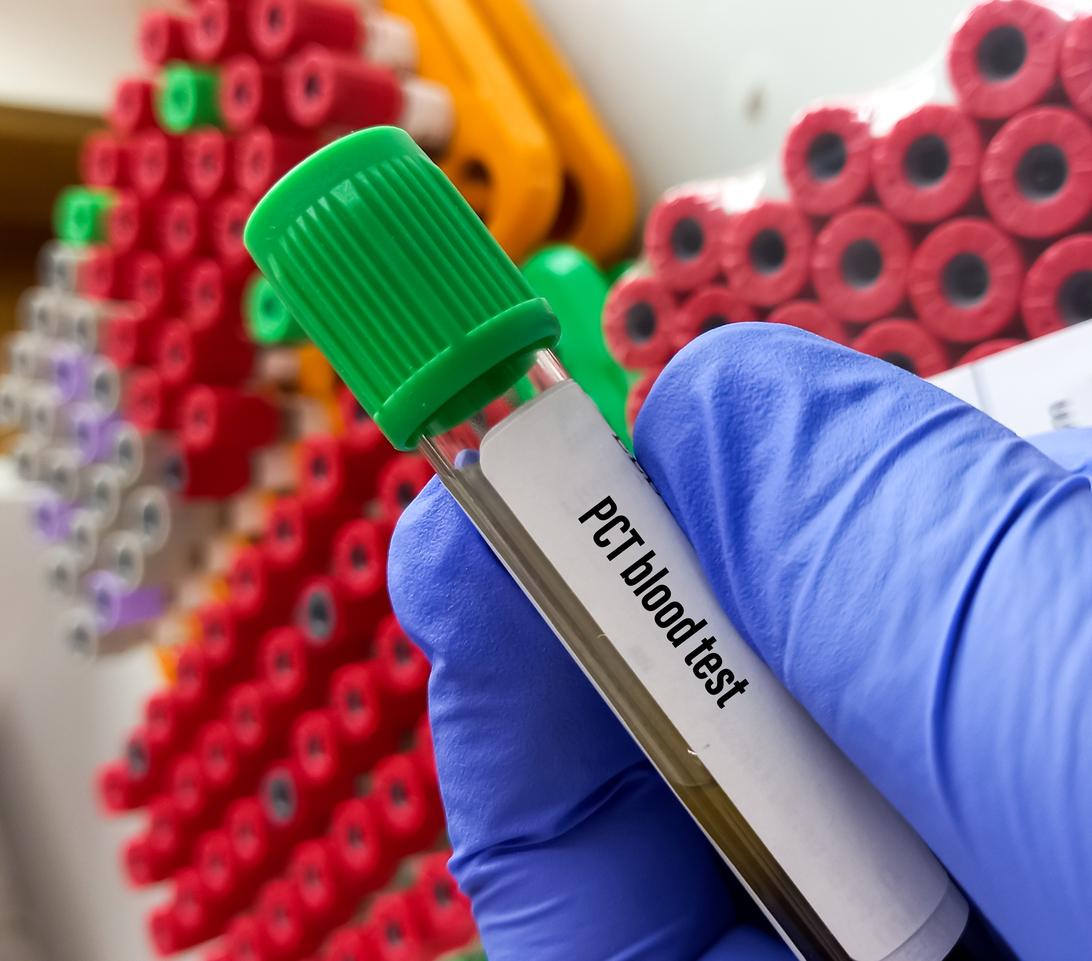A randomized controlled trial conducted in the United Kingdom found that a procalcitonin (PCT)-guided monitoring protocol safely reduced antibiotic duration in critically ill sepsis patients compared with standard care, according to a study published yesterday in JAMA.
But C-reactive protein (CRP)-guided protocols did not.
PCT and CRP are two blood serum biomarkers that help clinicians identify bacterial infections and have been used to aid decisions on when to discontinue antibiotic therapy for sepsis, an overwhelming reaction to infection that can result in tissue and organ damage and death. Timely, appropriate antibiotic treatment is critical for sepsis, which is commonly caused by bacterial infection. But the optimum duration of antibiotics for sepsis patients is unclear, and there are concerns about overtreatment.
While previous studies have found evidence that PCT safely reduces antibiotic duration in critically ill sepsis patients, the evidence is considered low-quality and recommendations for adoption of PCT-guided antibiotic discontinuation in sepsis care are weak, the study authors note. But they say the results of this trial "strengthens substantially" those recommendations.
PCT protocol cuts nearly a day off antibiotic duration
For the Biomarker-Guided Duration of Antibiotic Treatment in Hospitalised Patients With Suspected Sepsis (ADAPT-Sepsis) trial, a team led by investigators with the University of Manchester enrolled 2,760 adults with suspected sepsis at 41 National Health Service hospitals. Included patients had been initiated intravenous antibiotics within 24 hours of admission to a critical care or intensive care unit (ICU) and were expected to continue antibiotics for at least 72 hours.
From January 1, 2018, June 5, 2024, 918 patients were randomly assigned to a daily PCT-guided protocol, 924 to a daily CRT-guided protocol, and 918 to standard care. The biomarker-guided protocols were based on daily blood draws. Group assignment was concealed from patients, their relatives, clinical teams, and researchers.
The primary outcome for efficacy was total duration of antibiotics from randomization to 28 days, and 28-day all-cause mortality was the primary safety outcome. Secondary outcomes included antibiotic duration for the initial sepsis period. The trial aimed to detect a 1-day reduction in total antibiotic duration and show noninferiority with a 5.4% safety margin.
Among the randomized patients (mean age, 60.2 years; 60.3% male; average Sequential Organ Failure Assessment [SOFA] score, 7), there was a significant reduction in the total duration of antibiotic treatment from randomization to 28 days in the PCT-guided protocol group compared with the standard-care group (mean total duration, 10.7 days for standard care vs 9.8 days for daily PCT-guided protocol; mean difference, 0.88 days; 95% confidence interval [CI], 0.19 to 1.58). No difference was seen between standard care and daily CRP-guided protocol (mean total duration, 10.6 days for daily CRP-guided protocol; mean difference, 0.09 days; 95% CI, −0.60 to 0.79).
Although there was a significant reduction in the duration of antibiotics for the initial sepsis period for both biomarker protocols compared with standard care (daily PCT-guided protocol: mean difference, 1.13 days; 95% CI, 0.58 to 1.68 and daily CRP-guided protocol: mean difference, 0.71 days; 95% CI, 0.16 to 1.26), the initial reduction was not maintained by day 28 in the RCT-guided protocol group.
Analysis of all-cause mortality at 28 days found the daily PCT-guided protocol was noninferior to standard care (19.4% of patients receiving standard care vs 20.9% of PCT-guided patients; absolute difference, 1.57 percentage points; 95% CI, −2.18 to 5.32). The treatment difference for the daily CRP-guided protocol was inconclusive (19.4% for standard care vs 21.1% for CRP; absolute difference, 1.69 percentage points; 95% CI, −2.07 to 5.45).
Modest but meaningful impacts
"Supported by data on the implementation of these protocols, it is likely that the differential clinical effectiveness findings for daily PCT-guided and daily CRP-guided protocols are explained by the differences in the utility of these biomarkers to track inflammation caused by bacterial infection in the setting of critical illness, where PCT concentrations are known to increase earlier and normalize more rapidly than CRP in response to treatment," the study authors wrote.
The authors add that while the PCT-guided protocol's reductions in antibiotic duration were modest, they are equivalent to a 10% reduction in antibiotic use for sepsis, which they say could provide significant cost and labor savings and might also reduce the development of antimicrobial resistance.






















